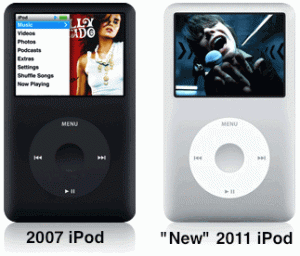
Over the past several years the market has been flooded with newfangled reading devices called “eReaders,” and virtually every website, magazine, and newspaper from Engaget to The New York times has compared these devices. But for some strange reason nobody has thought about comparing eReaders to the ultimate standard: tree books. You know, those old fashioned collections of words and pages that are made of dead plant matter. The ones that have filled libraries, bookshelves, coffee tables, and even washrooms since the beginning of time?
Ereading does sound like a great idea. I mean, who doesn’t want to have an “iPod for books” to carry around? Well, it might sound like another gadget is all you need to make reading fun and modern, but the market has missed the boat in a way that only a comparison can truly expose.
As such, let’s look at the innovation of recorded music. It all started around 1860 with crude recordings of live musical performances. At first the idea that one could listen to a performance without musicians was awe inspiring in itself, but over the past 150 years people have pushed the limits on recorded music, and the advancements have been astronomical. We have seen phonographs, records, 8 tracks, cassettes, CDs, SACDs Mini Discs, and now “virtual” media such as MP3s. The downside to such advancement, however, is that you experience the frustration of having to repurchase your entire music library every time such an advancement occurs to stay current. But the frustration and cost is worthwhile for many consumers, because each advancement is accompanied by a marked increase in performance, convenience, and quality. Music, you could say, is a technology where advancement is welcome, so long as the benefits outweigh the cost.
Reading is different. Books have existed in their current state for hundreds and hundreds of years, and the only real change was the transition from handwritten material to the invention of the printing press some 500 years ago. The printing press ushered in the modern era by increasing literacy rates and allowing the mass consumption of knowledge and ideas. Since then, the last real change to print material was the typewriter and personal computer, which increased the efficiency in which books could be composed and produced. So what does this mean? Well, after hundreds of years one can still open a book, understand the format, read the material, and take something away from the experience. Try doing that your proprietary Amazon eBook in just 10 years time.
One might think that after such perpetual sameness ebooks might seem like a welcome change, but there is a reason that they remained unchanged for so long. They worked, well! Regardless, the important distinction between music and print material is that “advancements” like the ereader are not a an improvement over real books. In fact, besides the ability to carry hundreds of books in a small package, the technology truly limits the reading experience by providing numerous distractions; causing eye strain, reducing the efficiency of study or research (you can only view one book at a time), preventing the reader from sharing the material, and all but eliminating tactile interaction with the “book.”
Unfortunately, due to the success of the iTunes store, Books are being treated like music in every regard, but this could not be further from the truth. The brilliance of iTunes was that it allowed the user to import their current music collection from CD, and then slowly start experimenting with purchasing digital media. Once the more customers got used to “owning” non-physical media, they bought more, and it’s gotten to the point where physical media is on the way out.
The Amazon Kindle Store and Apple iBooks, however, make you start from scratch and, as mentioned, any advancements that might exist provide no incentive for consumers to replace existing books, much less their entire libraries. Unlike music, the costs do NOT outweigh the benefits.
If this is the case, then why buy ebooks? And are eBooks really an alternative to real books? Take a look at this (albeit somewhat satirical) analysis and decide for yourself:
 The bottom line? Ebooks are no match for the real thing… yet. Books, unlike music, have been unchanged for hundreds of years, and ebooks are not cost effective, nor do they provide any real advancement over a physical book.
The bottom line? Ebooks are no match for the real thing… yet. Books, unlike music, have been unchanged for hundreds of years, and ebooks are not cost effective, nor do they provide any real advancement over a physical book.
However, in a cost comparison, the Amazon Kindle does appear to be competitive when compared to purchasing hardcover material for casual reading. So, if you must, get an ereader for casual reading and traveling, but don’t expect to burn your books and get rid of that space-sucking bookshelf any time soon. If you’re truly serious about reading, and not just pretending to read while you surf Facebook ad infinitum, you’ll stick to real books, and avoid the iPad like the plague.




 Posted by Sean.Perrin
Posted by Sean.Perrin 







